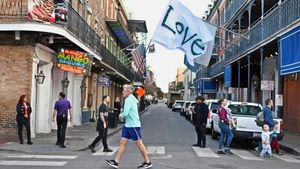Kentucky’s Republican-controlled Senate today approved a “license to discriminate” bill that would allow individuals and businesses to deny service to LGBT people without being penalized under local antidiscrimination ordinances.
Senate Bill 180 passed by a vote of 22-16, reports The New Civil Rights Movement. The bill’s lead sponsor, Republican Sen. Albert Robinson, contends the proposal is not discriminatory but rather necessary to protect people of faith from LGBT people who “are trying to force their beliefs down the throats” of those who act upon their religious convictions, the site reports.
The bill now moves on to the House, where Democrats hold a six-seat majority over Republicans.
If passed, the legislation would amend the state’s 2013 Religious Freedom Restoration Act to assure that it applies to providers of goods and services to the public, putting their work under the “protected activities” clause of the law. Anyone acting on a “sincerely held religious belief” would be protected from “being fined, imprisoned, held in contempt, or otherwise punished” for acting in accordance with those beliefs.
Opponents of the legislation contend that it opens the door not just to anti-LGBT discrimination, but to discrimination against a wide variety of people whose relationship status might run afoul of certain religious beliefs, including single mothers, interracial or interfaith couples, and divorced or remarried persons.
"This is an incredibly disappointing day in the Kentucky Senate," said Chris Hartman, director of the Fairness Campaign, a coalition of groups supportive of LGBT equality. "Despite bipartisan opposition to this 'license to discriminate,' our Senate has sent the message that Kentucky may not be open for business for everyone. We hope Kentucky House leaders will show greater wisdom and give this piece of legislation as much consideration as it deserves — none."
In earlier legislative discussion of the bill, Robinson made clear that his intent is to protect those businesses that don’t want to serve same-sex weddings, LGBT pride festivals, or other LGBT events. He said he knows of bakeries, flower shops, and photo studios whose owners wouldn’t want to be associated with same-sex weddings.
“All of these business owners want to treat everyone with full human dignity and respect,” Robinson said during the bill's committee hearing last month, where it passed 8-1. “But their consciences and religious beliefs prevent them from using their skills to promote a celebration that runs counter to what the Bible teaches about marriage. Shouldn’t their rights to freedom of speech and freedom of religion be respected?”
He also brought up the case of a Lexington T-shirt shop that declined to print T-shirts for an LGBT pride celebration in 2012 because of the owner’s religious beliefs. The local human rights commission found the shop violated Lexington’s antidiscrimination ordinance and imposed a fine; a court overturned the decision, but the court ruling is now on appeal.
Kentucky has no statewide law banning discrimination based on sexual orientation or gender identity, but eight cities in the state have such laws — Lexington, Louisville, Covington, Morehead, Frankfort, Danville, Midway, and Vicco.
Business leaders and local politicians in several of the towns with LGBT protections also blasted the Senate's passage of the bill in the Fairness Coalition's statement today.
"Our Human Rights Ordinance has been a real positive for Covington and has led to our city being more inclusive and welcoming, both positive attributes,” said Covington Mayor Sherry Carran. “Allowing discrimination by a business or a government office because they do not endorse a person¹s way of life or agree with a person¹s beliefs is harmful. It's harmful to the individual being discriminated against and harmful to the larger community as a whole."
Midway Mayor Grayson Vandegrift agreed, adding:
"Our community has taken a stand to extend protections in employment, housing, and public accommodations for all our residents. We believe it's the right thing to do and it's good for business. We believe our community should be open to business for everyone. Senate Bill 180 harms the hard work and good will of Kentucky communities like ours."





















































































